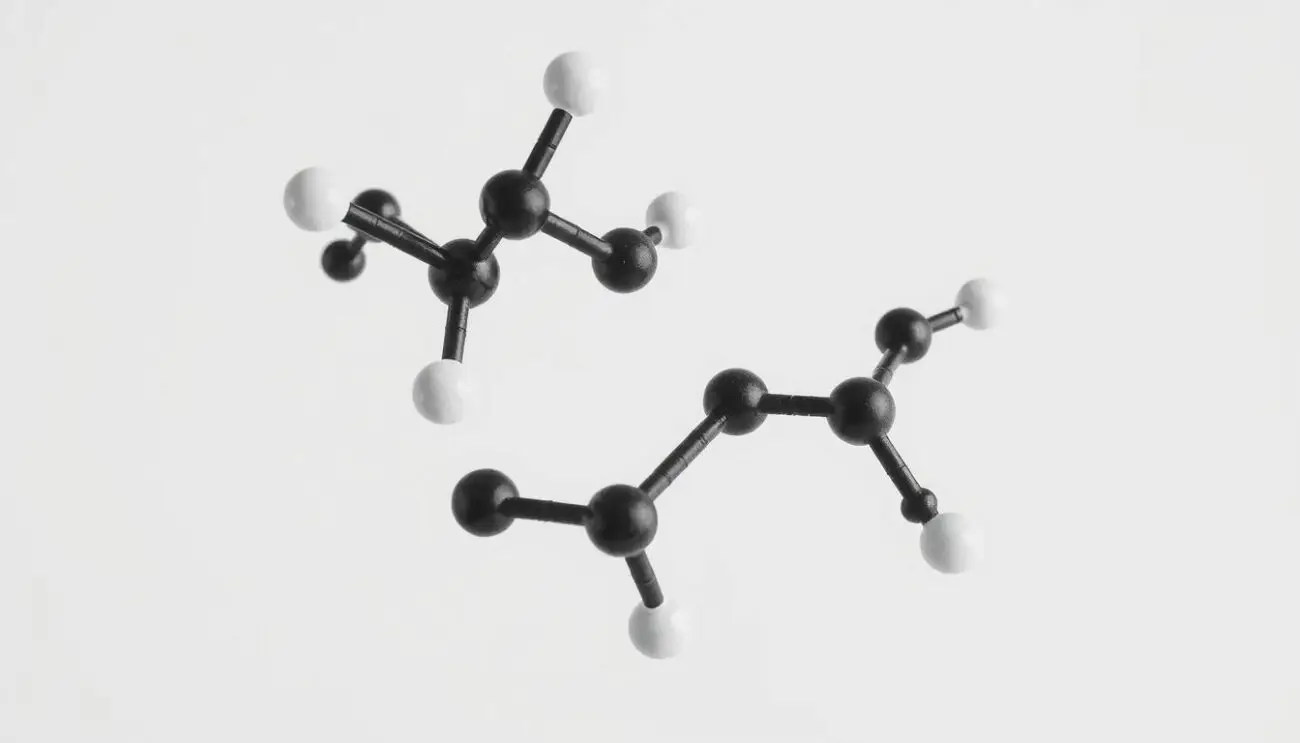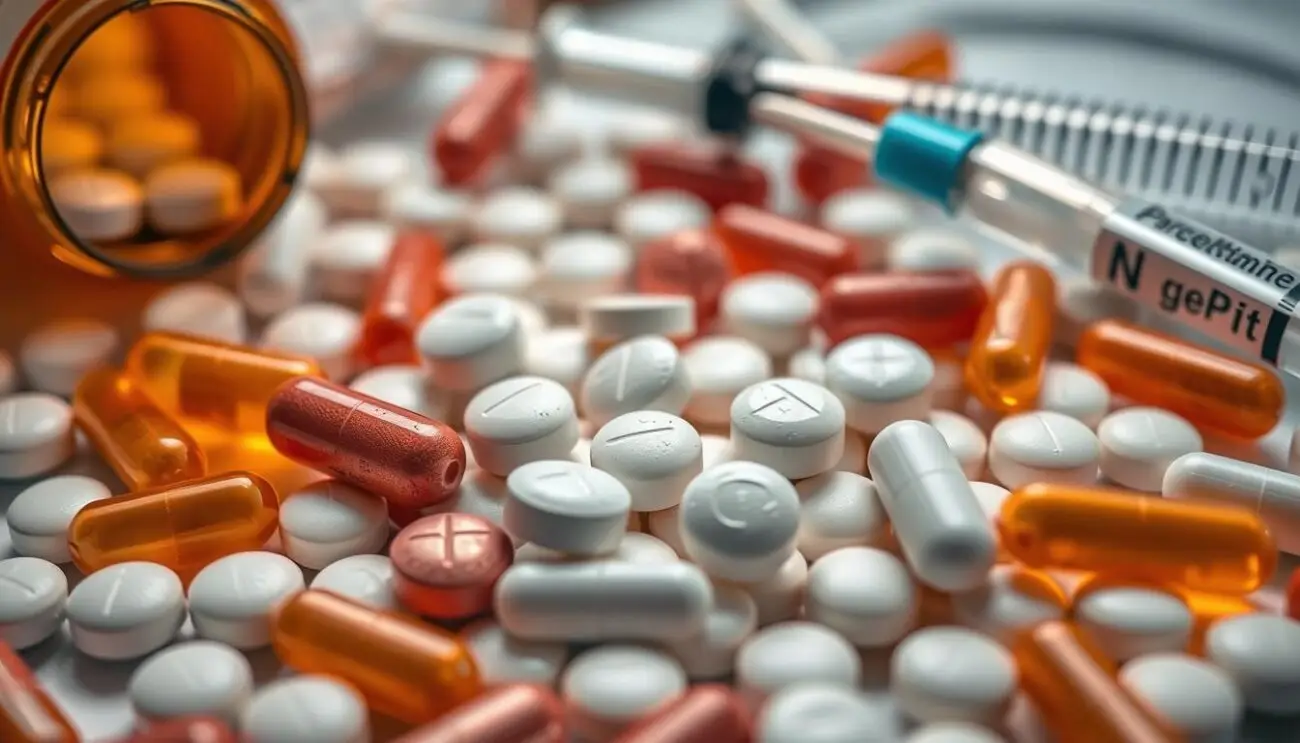Amphetmin: Understanding Its Effects and Risks
Amphetamine is a strong stimulant for the brain. It helps treat some medical conditions but is also highly addictive. Many people know it as Adderall or Ritalin, used for ADHD. When a doctor prescribes it, it can be safe and work well.
But, amphetamine sulphate, or ‘speed’, is often used for fun, not medicine. It makes people feel happy and can make them eat less, leading to weight loss. This misuse can cause serious problems.
This article will look into how amphetamine is used in medicine, its side effects, and its misuse. We aim to give a full view of the risks and effects of this powerful drug.
Introduction to Amphetamines
Amphetamines are a type of stimulant drug that affect the central nervous system. They work by making certain receptors in the brain more active. This leads to more activity of neurotransmitters like norepinephrine and dopamine. These neurotransmitters help with pleasure, movement, and focus.
What are Amphetamines?
Amphetamines are synthetic substances that have been used for medical reasons since the 1930s. They are mainly given to treat Attention Deficit Hyperactivity Disorder (ADHD) and narcolepsy. They help with focus, concentration, and staying awake. But, they are also misused because they make people feel euphoric.
Historical Background of Amphetamine Use
The first amphetamine, called Benzedrine, was made in 1887 and was used to help with congestion and breathing. In World War II, amphetamines were given to soldiers to keep them alert and awake longer. After the war, more people started using them, which raised concerns about abuse and addiction.
| Amphetamine Statistics | Data |
|---|---|
| Non-medical use of ADHD stimulant drugs among Ontario students (grades 7-12) | Around 2% in 2017 |
| Risks of regular non-medical amphetamine use | Tolerance, addiction, withdrawal symptoms |
| Chronic amphetamine use consequences | Physical and mental health issues, amphetamine psychosis |
Today, there is ongoing research and debate about the medical use of amphetamines. There are concerns about their long-term effects and abuse potential. Knowing about the history and current use of amphetamines helps us understand the challenges and risks they pose.

“Regular use of amphetamines, especially when smoked or injected, can quickly lead to addiction, causing cravings and compulsive drug use.”
Mechanism of Action of Amphetamin
Amphetamine is a stimulant drug that works on the brain’s central nervous system. It changes the balance of neurotransmitters in the brain. The mechanism of action of amphetamine stops the vesicular monoamine transporter (VMAT2) from storing neurotransmitters like dopamine and norepinephrine.
This action means these neurotransmitters stay in the synaptic cleft. Amphetamine also stops dopamine and norepinephrine from being taken back by the brain. This raises their levels even more.
With more dopamine and norepinephrine around, the brain’s receptors get more stimulation. This leads to feelings of alertness, focus, and energy. The amphetamine structure is key to this effect.
| Amphetamine Parameter | Value |
|---|---|
| Average weight of amphetamine | 135.2062 |
| Chemical formula | C9H13N |
| Therapeutic indications | Attention-deficit/hyperactivity disorders (ADHD), narcolepsy |
| Off-label uses | Obesity, depression, chronic pain |
| Isomer ratio for ADHD treatment | 3:1 (D:L) |
| Effect on neurotransmitters | Increases noradrenaline in prefrontal cortex, dopamine in striatum |
In summary, amphetamine works by changing how neurotransmitters are stored and taken back. This leads to more of these chemicals in the brain. This unique way it works helps it be used for some medical conditions but also poses risks.

Medical Uses of Amphetamin
Amphetamines are mainly used for two health issues: Attention Deficit Hyperactivity Disorder (ADHD) and narcolepsy. These drugs change brain chemicals to help manage symptoms of these conditions.
Attention Deficit Hyperactivity Disorder (ADHD)
People with ADHD find amphetamines helpful. They reduce hyperactivity, inattention, and impulsivity. Long-term use in kids with ADHD can also prevent brain changes.
Narcolepsy
Amphetamines help treat narcolepsy, a condition with too much daytime sleepiness and sudden muscle weakness. But, they’re being replaced by modafinil because of side effects.
Doctors closely watch the use of amphetamines because they can be misused. Patients must take their medication as told to avoid misuse and addiction.

“Amphetamines are strictly regulated globally due to their potential for abuse and addiction.”
Dosage and Administration of Amphetamin
Amphetamine medications come in different strengths and forms for various needs. The usual starting amphetamine dosage is between 5-40 milligrams (mg). This is taken 1-3 times a day, with a top daily dose of 60 mg for adults. There are immediate-release tablets and extended-release capsules or solutions available.
Dosage Strengths and Forms
Immediate-release amphetamine tablets help find the best daily dose. Then, patients can switch to extended-release forms for once-a-day use. These extended-release types give a steady flow of the medicine all day. Always take amphetamine as your doctor says, at the same time every day, to avoid withdrawal symptoms.
Proper Usage Guidelines
Don’t take more amphetamine dosage than prescribed, as it can cause serious side effects. Take amphetamines exactly as told, usually in the morning. This helps keep levels steady in your body and lowers the chance of side effects. Knowing how to take amphetamines is key for getting the best results and staying safe.
“Always follow the instructions provided by your doctor or pharmacist when taking amphetamine medications.”
Storing medicines right is also key. Keep them in a closed container at room temperature. Make sure they’re away from heat, moisture, light, and freezing.
Following the right amphetamine forms and dosage helps manage your condition safely and well. A qualified healthcare professional should guide you.
Side Effects of Amphetamin
Amphetamines are a type of stimulant drug that can cause both physical and mental side effects. These effects can vary in how severe and how often they happen. This depends on the dose, how long the drug is used, and the person taking it.
Physical Side Effects
Some common physical side effects of amphetamines include high or low blood pressure, a fast heart rate, stomach pain, not feeling hungry, losing weight, acne, and a dry mouth. In some cases, people might also have seizures.
- Loss of appetite and weight loss
- Dry mouth
- Stomach upset or pain
- Nausea and vomiting
- Dizziness and headaches
- Diarrhoea
- Fever
Psychological Side Effects
Amphetamines can also affect the mind, making people feel more alert, focused, and energetic. But, they can also cause anxiety, mood swings, and trouble sleeping. In rare cases, people might experience psychosis.
- Increased alertness and focus
- Anxiety and irritability
- Mood swings
- Insomnia
- Rare cases of psychosis
Using amphetamines for fun or taking more than the doctor said can increase the risk of serious side effects. But, taking the drug as prescribed usually means fewer severe side effects.
According to the Mayo Clinic, “Serious side effects, including blood pressure increase, blood flow problems, mental/mood/behaviour changes, vision changes, and sexual function changes, may occur in some users.”
| Side Effect | Prevalence |
|---|---|
| Loss of appetite and weight loss | Common |
| Dry mouth | Common |
| Stomach upset or pain | Common |
| Nausea and vomiting | Common |
| Dizziness and headaches | Common |
| Diarrhoea | Common |
| Fever | Common |
| Increased alertness and focus | Common |
| Anxiety and irritability | Common |
| Mood swings | Common |
| Insomnia | Common |
| Rare cases of psychosis | Rare |
Risks and Contraindications of Amphetamin
Amphetamins can help with some conditions but come with risks and contraindications. It’s important to know these before taking this medication.
Effects on Child Growth
Using amphetamines for a long time can slow a child’s growth. Studies have shown that it can affect their height and weight. But, they may grow more after stopping the medication.
Cardiovascular Risks
Amphetamines can make your heart rate and blood pressure go up. These changes are usually not bad but can be risky for people with heart problems. It’s important to watch these effects closely when taking amphetamines.
| Potential Side Effect | Occurrence Rate |
|---|---|
| Raised Blood Pressure | This medication may raise your blood pressure. |
| Serious Side Effects | Tell your doctor right away if you have any serious side effects. |
| Allergic Reactions | A very serious allergic reaction to this drug is rare. |
Amphetamines are not good for people with certain health issues, like heart disease or high blood pressure. They’re also not good for those with glaucoma, thyroid problems, or a history of drug abuse. It’s important to watch the dose closely, especially in kids and teens.
“Careful monitoring is required, especially in children, to mitigate the risks associated with amphetamine use.”
Recreational Misuse of Amphetamin
Amphetamines are often misused for fun, known as ‘speed’. Taking them in large doses or in ways not meant for medicine can cause big problems. These include psychosis, paranoia, heart issues, poor thinking, and not eating well. People may also feel sad and have trouble sleeping when they stop taking them.
Using amphetamine substitutes like methamphetamine and cathinone is even riskier. In 2019, about 5.8% of Australians had tried meth/amphetamines at least once, which is around 1.2 million people. That year, 1.3% of Australians used them in the past year.
Unwanted Effects of ‘Speed’
Drugs like Adderall, Ritalin, and Desoxyn are given to people with ADHD or narcolepsy. But using them for fun, or ‘speed’, can cause bad effects. These include:
- Restlessness and high blood pressure
- Mental health issues such as psychosis and paranoia
- Cardiovascular problems, including heart attack or stroke
- Reduced cognitive ability and malnutrition
Stopping amphetamines can be hard and may make you feel sad or have trouble sleeping. Being addicted to these drugs can lead to big problems. Getting help from a professional is key to getting better.
| Statistic | Value |
|---|---|
| Australians who had used meth/amphetamines at least once in their lifetime (2019) | 5.8% (approx. 1.2 million individuals) |
| Australians who had used meth/amphetamine in the last 12 months (2019) | 1.3% |
| Average age for Australians trying meth/amphetamines for the first time | 22 years old |
| Age group most significantly associated with meth/amphetamine use | 20-29 years old |
Using amphetamine, or ‘speed’, for fun can cause many bad effects. These range from feeling restless and having high blood pressure to mental and heart problems. Getting addicted to these drugs can lead to serious issues. It’s important to seek help from a professional if you’re struggling.
Amphetamin Substitutes and Street Drugs
Amphetamine is a strong stimulant drug with many substitutes and street drugs linked to it. These substances, often made illegally, can have various effects on users. They can be stimulants, hallucinogens, or make people feel more connected to others. But, since their makeup is not controlled, people might take something they didn’t mean to. This can be very dangerous and even deadly.
Some common amphetamine substitutes and street drugs include:
- Methamphetamine
- Cathinone
- Ephedrine
- MDMA (ecstasy)
- 2,5-Dimethoxy-4-methylamphetamine (DOM)
These drugs are related to amphetamine but can have very different and unpredictable effects. Making and using these amphetamine substitutes illegally is risky. It can lead to overdose, addiction, and harm to the brain and heart over time.
| Substance | Effects | Risks |
|---|---|---|
| Methamphetamine | Highly addictive stimulant, can cause euphoria, increased energy, and psychosis | Severe cardiovascular problems, brain damage, and potentially fatal overdose |
| Cathinone | Stimulant and empathogenic effects, similar to amphetamine and MDMA | Increased heart rate, blood pressure, and body temperature, risk of psychosis |
| MDMA (ecstasy) | Hallucinogenic and empathogenic effects, can induce feelings of euphoria and connectedness | Dehydration, overheating, and potential for long-term neurological damage |
The illegal production and use of these street drugs related to amphetamine are a big health issue. People should be very careful when thinking about using any substances they don’t fully understand.
“The misuse of substituted amphetamines was noted as far back as 1936.”
Interactions and Precautions with Amphetamin
Amphetamines are a type of stimulant drug that can interact with many other medicines. Doctors need to know all the medicines and supplements a patient uses before giving them amphetamines. Some health conditions, like heart disease, high blood pressure, and past mental health or drug use issues, mean amphetamines are not safe.
Patients should not drink alcohol with amphetamines as it can cause dangerous reactions.
Amphetamines can work with other drugs like antacids, antidepressants, and blood pressure medicines. For example, taking medicines that make the stomach or urine alkaline can change how amphetamines work. Also, mixing them with drugs that change serotonin levels can cause serotonin syndrome, a serious condition.
| Interaction Type | Potential Risks |
|---|---|
| Amphetamine and Isocarboxazid, Phenelzine, Tranylcypromine | Severe interactions that can lead to serious adverse events |
| Amphetamine and Medications Affecting Serotonin Levels | Increased risk of serotonin syndrome |
| Amphetamine and Medications Increasing Stomach/Urine Alkalinity | Altered drug absorption and effectiveness |
| Amphetamine and Alcohol | Unsafe reactions and increased risk of adverse effects |
It’s important for patients to tell their doctors about all medicines and supplements they use, including any health issues. This helps manage amphetamine interactions and safety risks for better treatment.
Amphetamin: Understanding Its Effects and Risks
Amphetamines are strong drugs that boost dopamine and norepinephrine in the brain. They’re used to treat ADHD and narcolepsy. But, they’re also highly addictive because they make people feel good.
Using amphetamines for fun can cause big problems for your body and mind. A 2006 study showed how amphetamines affect healthy people. Doctors need to watch patients closely to make sure the benefits are worth the risks. It’s also key to take the drugs as directed to avoid addiction or overdose.
The “2022 Annual Report of the National Poison Data System” highlighted a rise in amphetamine poisonings. A 1989 study looked at how haloperidol affects people who use cocaine and amphetamines. It showed how dangerous these drugs can be.
| Amphetamine Effects | Amphetamine Risks |
|---|---|
| – Increased energy and alertness – Euphoric “high” feeling – Improved focus and concentration – Reduced appetite |
– Cardiovascular problems – Psychosis and hallucinations – Addiction and dependence – Adverse effects on child growth |
The National Survey Results from 1975-2022 showed a rise in amphetamine use among teens. This highlights the need for more education and prevention. A 2005 study also pointed out the dangers of amphetamine-induced movement disorders.
In summary, amphetamines have medical uses but come with big risks. Healthcare workers and patients must watch out for the amphetamine effects and amphetamine risks. Following dosage advice and being aware of the addiction risk is key to avoiding the downsides of amphetamines.
Signs of Amphetamin Toxicity and Overdose
Amphetamine toxicity and overdose can show many worrying signs. The healthline22.com/faq/ lists important signs to look out for. These include hypertension, tachycardia, tachypnea, hyperthermia, agitation, and psychosis. The exact symptoms can change based on the amphetamine type and other substances taken.
Using amphetamines a lot and in large doses can harm the brain’s dopaminergic terminals. This might lead to blunted physiological responses and make addiction worse. Getting quick medical help is key if someone has taken too much amphetamine to avoid serious harm.
Research shows that methamphetamine use puts a big strain on healthcare. The National Epidemiologic Survey on Alcohol in 2006 found out how common and linked amphetamines are to other drugs in the US.
Long-term amphetamine use can cause permanent harm to the brain. This makes it vital to know the long-term effects of these drugs. Studies also show how amphetamines can affect future generations, especially girls and women.
“A 2008 study looked into how amphetamines can cause heart attacks in young people. It showed the big health risks of using these drugs.”
Amphetamine toxicity and overdose bring not just physical and mental risks but also legal, social, and mental health consequences. Spotting the signs early and getting medical help quickly is key to avoiding these bad outcomes.
Withdrawal Symptoms of Amphetamin
Amphetamines, like Adderall, can be addictive. Even with a doctor’s prescription, people can become dependent. Stopping the drug can lead to withdrawal symptoms. These symptoms can be hard to handle and may last for months.
The first few days of withdrawal bring symptoms like a lot of sleep, feeling sad, eating too much, and strong cravings. These symptoms can last for weeks or even months. Mood swings, cravings, trouble sleeping, and feeling very tired are common.
Some people may start to have psychotic symptoms in the first two weeks after stopping amphetamines. This is more likely if they had these symptoms while using the drug. In such cases, staying in a hospital might be needed to help manage these episodes.
How bad withdrawal symptoms are can vary a lot from person to person. Factors like age, gender, weight, and how much of the drug was taken can affect it. It’s very important to talk to doctors during detox to get the right help and lower the chance of going back to using the drug.
| Withdrawal Symptom | Duration |
|---|---|
| Initial Phase | 1-2 days |
| Subsequent Phase | Several days to weeks |
| Psychotic Symptoms | 1-2 weeks |
| Post-Acute Withdrawal Syndrome (PAWS) | Up to 1 year |
There is no single medicine that works well for amphetamine withdrawal. But, supportive care and counselling are key to treatment. Some medicines like antidepressants, benzodiazepines, and antipsychotics might help a bit, but they’re not always effective.
If you’re facing amphetamine withdrawal, getting help from professionals is a good idea. Services like the Alcohol and Drug Information Service (ADIS) and the Drug and Alcohol Clinical Advisory Service (DACAS) can offer support. With the right medical care and a detailed treatment plan, overcoming amphetamine withdrawal is possible, leading to a lasting recovery.
Conclusion
Amphetamines are strong drugs with both medical benefits and risks. They help treat ADHD and narcolepsy when used right. But, taking them for fun or more than the doctor says can cause serious harm.
Doctors need to watch patients on these drugs closely. Patients must follow the dosage advice to stay safe. Knowing about amphetamines, like their effects and risks, helps use them safely.
More people, especially the young, women, and those in tough situations, are using amphetamines. This calls for better treatment options for those with addiction. Healthcare workers can help by spreading the word and using proven treatments. This can lessen the health problems from using these drugs wrongly.


